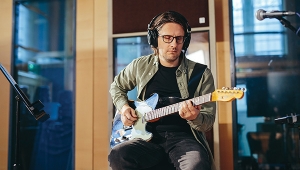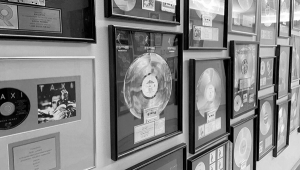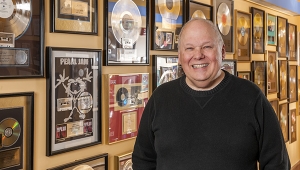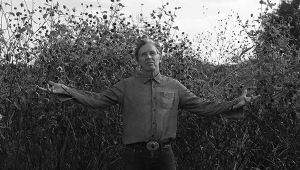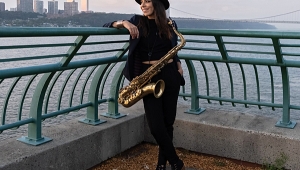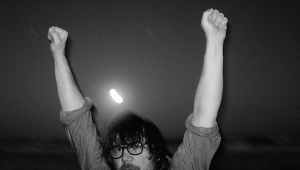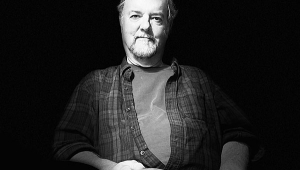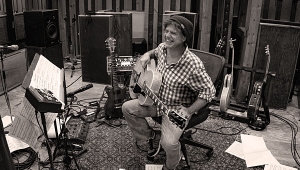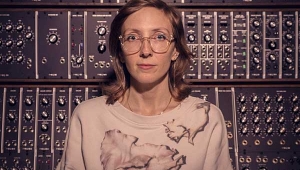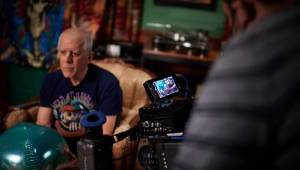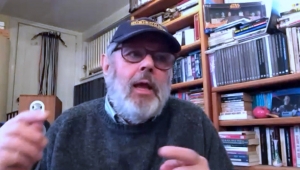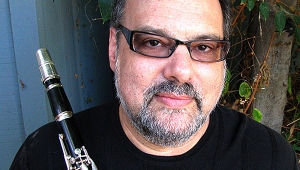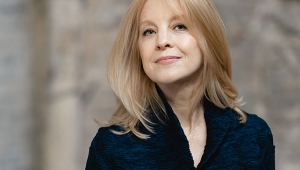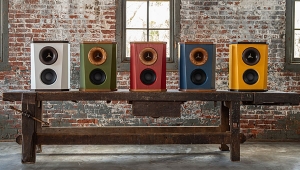| Columns Retired Columns & Blogs |
Iván Fischer: The Maestro on Multichannel
Iván Fischer, founder and conductor of the Budapest Festival Orchestra, has performed with many major orchestras and recorded for a number of major labels, most significantly with Philips, from 1995 to 2004. Fischer/BFO made the first multichannel orchestral recording for SACD, which Philips used as a demonstration disc for their first SACD players. I still treasure that disc—it demonstrates many of the advantages of the medium with a wide and varied program—but it has never been commercially released.
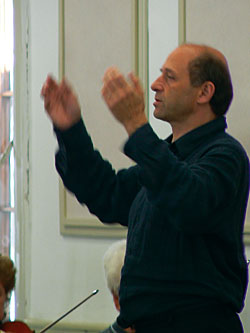 In 2004, Fischer/BFO began an exclusive arrangement with Channel Classics that has resulted in a series of acclaimed recordings, all of them on multichannel hybrid SACD/CDs. Recently, Fischer was named Principal Guest Conductor of the National Symphony Orchestra in Washington, DC.
In 2004, Fischer/BFO began an exclusive arrangement with Channel Classics that has resulted in a series of acclaimed recordings, all of them on multichannel hybrid SACD/CDs. Recently, Fischer was named Principal Guest Conductor of the National Symphony Orchestra in Washington, DC.
In September 2006, my wife (NL) and I were privileged to sit in and observe a rehearsal of J.S. Bach's B Minor Mass with Fischer and the BFO at their rehearsal hall in the Obuda section of Budapest. Afterward, Fischer sat with us and talked about recordings and, specifically, SACD recordings.
Kalman Rubinson: How do you see multichannel SACDs changing recording and listening?
Iván Fischer: I probably am a different case than some other colleagues. I don't know if you know that we were involved in the development of the DSD technology of Super Audio CD. I don't know how many years ago, maybe five years ago approximately, there was a mixed team of Sony and Philips. I was working with Philips team, and they were working on a system called DSD, I think, and we made an agreement because we were very excited that this experimental team was in Budapest. They recorded a number of things we were doing and we experimented a lot with the sound, and DSD finally emerged as the surround system in Super Audio CD. When we finished the experimental period, we created one record, the very first Super Audio CD for any classical music, and they used it for testing machines in shops. Actually, musically speaking, it wasn't one of the best recorded—it was just the final concept of this last experimental period—but for me it's a little bit like my baby, this SACD. I am very attached to it.
But back to answer the question: I think the leap between a normal CD and a SACD being listened [to] on a surround system is for me a larger leap than from analog to digital—a fantastic difference. First, I think the surround experience is a tremendous success; it was the first time that I put on a CD I genuinely felt was similar to being in a good hall, listening to music, because some of the sounds come from my back, from the side, the front, like in a good concert hall. And any type of stereo experience, when you listen to two boxes, somehow now I can't listen to it anymore because it's an artificial thing.
Rubinson: You spoke both of DSD, which offers higher resolution than CD, and of multichannel. Which of these is more significant to you?
Fischer: Of course, I can't separate one from the other aspect of SACD, but for me it means multichannel, and that's wonderful.
Rubinson: Do you do anything differently now to record in this new medium?
Fischer: I find it a little easier to record. I remember having to record for stereo. We were struggling a lot to get good sound. It was like, maybe something is wrong, maybe the bass is too reverberant, or violins don't have enough high register. All kinds of frustration we had trying to get it right. But with multichannel system, it seems we record: We go into a room and it's immediately better, it's less effort.
Rubinson: Well, that's a surprise.
Fischer: It's a great thing. It's a wonderful experience.
NL: Do you have to move performers when you are recording without an audience?
Fischer: Very occasionally. I'll give you an example. If there's a very loud instrument behind a very soft instrument, that can be a problem. If you play a cymbal behind a viola, then it's very difficult to get the viola sound; so you have to create a certain amount of distance so the microphone picks up both. But this is a slight adjustment, and generally the same as for a concert.
Rubinson: Many orchestras are now recording all their concerts and releasing them on SACD. Have you considered this?
Fischer: You know, I am a kind of dinosaur, I imagine, because I still believe in studio recording. There are orchestras that have moved away [from this], and most orchestras now release their concerts. I'm terribly old-fashioned; I still believe in a proper recording with a recording session in a concert hall. But it's a funny thing. One could argue that a live concert has something wonderful and spontaneous, which is nice, and I can agree. But very often it's misleading. You think you have a great experience at a concert, you love it and you adore it. Then you hear it again and say, "My God, was it really this? Why this disappointment?" My guess is that in a concert you see and feel what kind of atmosphere you have around you. To listen to something which happens once is a very different thing than to listen to a recording, and for me, it's the difference between theater and film. If you go to a theater performance, it happens once, but a film needs to be done in a way that you can look at it many, many times and it's always exciting. And this difference between theater and film for me also exists in live concert performance and audio recording. So we record like we would shoot a film.
Rubinson: One reason for these live recordings is the economic advantage, since the microphones are always in the concert hall.
Fischer: That's kind of a compromise. My very, very strong feeling is, if you record something, there is no point to make any compromise. It will stay for many generations, so why not give a little more sacrifice economically, or whatever, and put in that little extra time to create a great recording? So we do make those sacrifices.
Rubinson: Now that you've done some Tchaikovsky, Rachmaninoff, and Mahler, what are you planning for your forthcoming Channel Classics recordings?
Fischer: I want to stress that it's not going to be a full Mahler series. I know we recorded two Mahler symphonies. The problem with [a] full cycle is that, as a performer, you have to do works that you don't feel strongly about. But I'm much more choosy. I like to choose which works I really feel strongly about, works I feel I understand and have something to say [about]. There are some great works where I feel I don't have the key, I don't have the answer; I let my colleagues do those. For example, I don't think I have any desire or any kind of attachment to do Mahler's Eighth Symphony. I don't want to do it because I don't have the key to it, so I'm very happy it doesn't have to be a full cycle. Somebody else should do it. I am very excited to hear Mahler's Eighth symphony on SACD, and I would certainly buy it recorded by someone else, yes.
Rubinson: So, what would you like to do?
Fischer: It's like picking the best. You know, that's what we try to do—not eat the whole bowl, but just take out single cherries. For example, from the Mahler symphonies, after the Sixth and the Second, which [are] released now, one day I might do maybe three or four other symphonies, but not all. I think our recording strategy is just to do individual recordings which have nothing to do with cycles, and always works which are very, very important to me and the orchestra. There will be some very well-known pieces which are very often played, but there's always a reason why we want to record it. And there will be some rarities which I'm very happy that we can offer because they are neglected. One of these will come out maybe in half a year, Josephs-Legende by Richard Strauss. There are one or two recordings, but we spent a hell of a lot of time working on it; we really tried to think through the essence of the piece, and finally recorded it. I'm very happy that we can complete it.
Rubinson: That's refreshing. Usually, when we have a new medium, people feel obliged to record the obvious mainstream works and blockbusters.
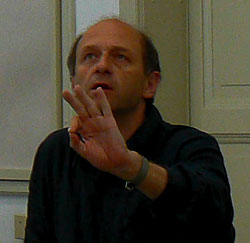 Fischer: It's probably true. The CD, coming after the LP, created exactly this type of mentality: Let's record everything again. Now, looking back at it, I know many musicians prefer that old LP, not because of the technical quality but because of the musical and the human quality. Nothing can say more about the works than the generation of Richter and Oistrakh and Furtwängler and all those music giants, and so I think one has to be very cautious about it, very careful that the new technology doesn't give you a too easy excuse to record something. You should only record something if you feel very strongly about that piece, and not because you are jumping at new technology. I think the musical values must be very high.
Fischer: It's probably true. The CD, coming after the LP, created exactly this type of mentality: Let's record everything again. Now, looking back at it, I know many musicians prefer that old LP, not because of the technical quality but because of the musical and the human quality. Nothing can say more about the works than the generation of Richter and Oistrakh and Furtwängler and all those music giants, and so I think one has to be very cautious about it, very careful that the new technology doesn't give you a too easy excuse to record something. You should only record something if you feel very strongly about that piece, and not because you are jumping at new technology. I think the musical values must be very high.
Rubinson: New technologies often invite attempts to record in new ways. Have you found new recording ideas?
Fischer: One very important aspect which I very often discuss with recording experts is, What kind of sound do you try to imitate? Do we try to imitate someone sitting around the 10th row of a great-sounding hall? Because—let's forget recording for a moment—you know a good hall is a very relative thing, and it depends where you sit. If you sit somewhere near the middle or the back, or on the side in a box, you get completely different sounds. My experience is that the ideal sound would be, in a good hall, if you put up a little ladder like a tennis umpire's—you know where they sit—in the middle of the concert hall. That person would have the ideal sound. But there are no seats there for a floating audience member.
Rubinson: Classical listeners usually prefer a conventional audience perspective, but others dote on getting more detail from a close-up perspective.
Fischer: We think the ideal is closer. My dream would be that people would sacrifice a little bit of distance, which they are used to, and have the courage to record a little closer to the orchestra, because then they hear a certain aliveness and energy level, and a certain excitement, which is not yet reproducible from a distance.
I always told my recording-engineer friends that I'm a conductor and I have a certain position: I hear the orchestra from very close, actually surrounded by musicians, and it's an unimaginably beautiful experience. It's something that the audience is not aware of because they hear the orchestra from a distance. I'm surrounded by them. I was talking to a very good friend of mine, a viola player, who said that he doesn't like to listen to recordings because it seems so far away that it's uninteresting. But when he sits in the middle of the orchestra, hearing the orchestra around him, it's magic.
What about putting a microphone exactly where I hear the orchestra? I could share that certain beauty which people are not aware of. Once we did an experiment, which we recorded on the Rachmaninoff disc [Channel Classics CCS SA 21604]. There is one piece on the record, the Vocalise, where we did exactly this. We put the microphone at my position, and you can listen and make up your mind what you think. Anyone who is interested should listen to this, because there is no compromise. It is recorded from where my ears are. Usually, the argument about this is that people like space—you know, a little distance—because this is what people are used to in a concert hall. But I'm used to being near the music, so I highly advocate that people should stand with me, the conductor, and listen to the sounds.
Rubinson: Thank you.
- Log in or register to post comments
